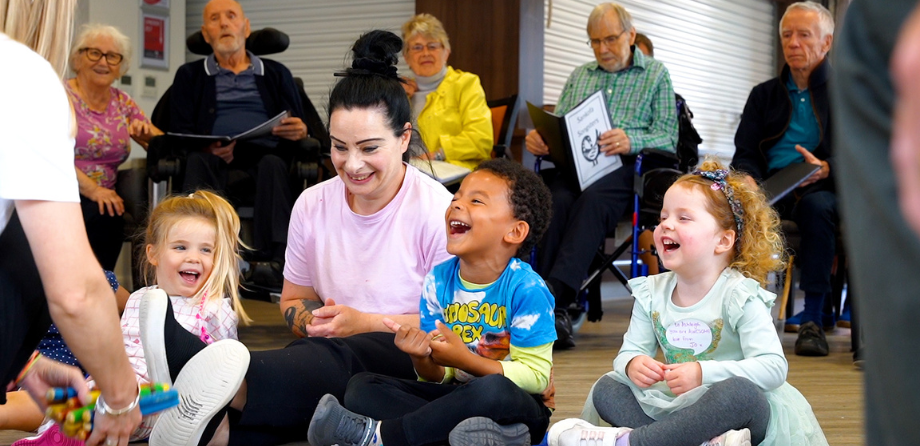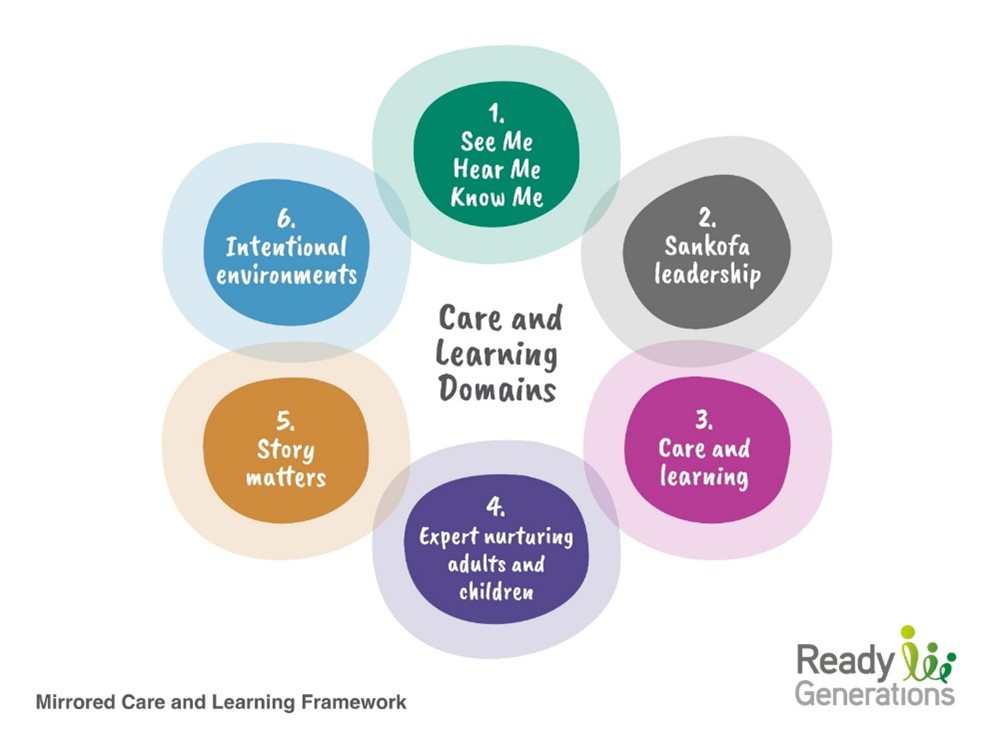
Generational paperchains – an interview with The Nursery In Belong
The Nursery in Belong, Chester, won NDNA’s Nursery of the Year 2025. We recently sat down for an interview with the setting for our Autumn 2025 edition of Nursery News for some insight into their approach.
You’re a multi award-winning nursery – what in a nutshell makes you stand out as a provider of excellence?
Above everything, we are so very fortunate to have a wonderfully diverse community around us who support us all the way! As an intergenerational nursery we have people of all ages helping us and offering their wisdom and expertise. Our team, community and children love to spend time together and we prioritise inclusive experiences so that everyone can get involved.
We are also very clear about the importance of leading with moral purpose and courage. We are not afraid to try new things and take safe risks. As a team, we are always looking for ways we can get better so that our children have more opportunities to learn, grow and fully enjoy their childhood.
Tell us more about your Mirrored Care and Learning Framework?

We are a Froebel inspired nursery and use the Froebelian Principles to guide our work alongside EYFS. We also think the Froebelian Principles work well for older people. As an intergenerational nursery where older people are learners and lead learning alongside the children, we have created a bespoke intergenerational curriculum that sits alongside the EYFS and Froebel principles. This not only helps with the planning and monitoring of all-age experiences, it also enables us to meet the needs of everyone and demonstrate clearly the additionality that intergenerational approaches bring in terms of both child and adult outcomes.
The curriculum is organised around 6 interconnected domains as set out in the diagram.
What about your intergenerational ethos – how does this work and how does it benefit children, staff, families and the older people that live there? What are the key considerations for nurseries wishing to go down this route?
Our intergenerational ethos is a simple one that is central to everything we do – people always come first! Our focus on relational pedagogy means that we have become ‘expert noticers’ and observers of children, families and older people. We view needs and aspirations holistically so that we can see how things are connected and interrelated as well as understanding the diverse needs of individual children at particular stages of their development. We consider our environment to be a ‘human eco-system’ where connection and change are always present . This helps us to make sure we don’t overlook something that is important and don’t get trapped into ways of working that don’t enhance learning or help children and their older friends to make progress. For settings starting out on their intergenerational journey, safe and trusting, reciprocal relationships are literally the beating heart of this work. Strong relationships takes consistency and time to achieve, but are so worth it enabling both groups to become more confident and curious around each other.
You have been involved in research – how has that shaped your practice?
We view inquiry based learning to be a core driver for improving our setting. We see ourselves as active learners alongside the children and older people and encourage the whole community to constantly ask the simple question:
‘I wonder what would happen if ………’
We find this approach gives us all an opportunity to ask questions, follow unique interests and actively seek out solutions and answers both individually and as a learning community. We model this through the planning of learning provocations, invitations and resources that shape our practice for the better by encouraging us to be reflective and more evaluative about what works and how we are intentional about measuring progress and impact.
We know some of your staff have been through difficult times recently – how did you keep positive for the children?
This is a challenging and uncertain moment in time for everyone involved in early education and care. The changes we face from September 2025 are unsettling and will require flexibility and a real focus on team well-being and confidence. As a small team trying to pioneer new ways of working, we accept that change can be difficult and that we will succeed at some things and learn from our mistakes at other times. We get through the hard times by being there for each other both personally and professionally. Domain One of our bespoke curriculum is:
‘See Me, Hear Me, Know Me’
We apply this to everyone in our community as we believe that when others really see us we are able to be at our best and do our best work. This gives everyone confidence to share worries and fears in a safe space, knowing that they will be listened to. In turn, it enables us to ensure our environment is nurturing, warm and loving for everyone.
How do you support children with additional needs and what approaches have you found to be most effective in your unique environment?
We use a range of approaches and strategies to support and understand all our children and try to identify children who may need additional support as soon as possible so they can enjoy all aspects of nursery life and thrive. Domain 6 of Our Mirrored Care and Learning Framework prioritises ‘intentional environments’ that are deliberately planned to not only be warm and welcoming but also structured to meet diverse needs. This means paying careful attention to such things as noise and light levels, air quality, sleep patterns, nutrition, decoration, resource quality and fixtures/fittings. This focus on detail also supports our older friends, particularly those living with dementias.
Do you have any plans for the future and what motivates you to keep moving forward?
As a learning-oriented setting, we are always looking for ways to expand our knowledge, skills and understanding so that we feel confident that we’re doing the very best possible for our children and community.
Going forwards, we are keen to support other settings to develop their intergenerational ideas and to research more about the potential role of older people in children’s learning and development, whether as a grandparent, neighbour, friend or volunteer.
We are also currently working with the University of Liverpool’s Centre for Ageing and the Life Course to advance understanding and awareness around the importance of early years in terms of our lifelong health and wellbeing.
- Business
- Leadership
Similar Articles
STEMinists in the making: Encouraging girls’ confidence in science

Early years activity: Pancake creations


